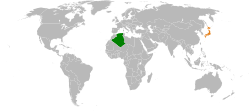
Algeria, officially the People's Democratic Republic of Algeria, is a country in the Maghreb region of North Africa. It is the largest country by total area in Africa and in the Arab world. It is bordered to the northeast by Tunisia; to the east by Libya; to the southeast by Niger; to the southwest by Mali, Mauritania, and Western Sahara; to the west by Morocco; and to the north by the Mediterranean Sea. The country has a semi-arid geography, with most of the population living in the fertile north and the Sahara dominating the geography of the south. Algeria covers an area of 2,381,741 square kilometres (919,595 sq mi), making it the world's tenth largest nation by area. With a population of 44 million, Algeria is the ninth-most populous country in Africa, and the 32nd-most populous country in the world. The capital and largest city is Algiers, located in the far north on the Mediterranean coast.

Though the Ministry of Foreign Affairs (MOFA) is the government agency responsible for the conduct of foreign relations of Nepal, historically, it is the Office of Prime Minister (PMO) that has exercised the authority to formulate and conduct policies related to Nepal's foreign affairs. As a landlocked country wedged between two larger and far stronger powers, Nepal has tried to maintain good relations with both of its neighbors, People's Republic of China and Republic of India. However, its relationship with India, remains utmost priority due to open border and similarity in culture, tradition, geography, living practices. The relationship between the two countries was significantly hampered during the 2015 Nepal blockade. Where the Nepal Government accused India of the blockade, India strictly denied the allegation and said the blockade were imposed by Madheshi protesters. For the most part though, Nepal has traditionally maintained a non-aligned policy and enjoys friendly relations with its neighboring countries and almost all the major countries of the world.

The Algerian People's National Army is the military force of the People's Democratic Republic of Algeria. It is the direct successor of the National Liberation Army (ALN), the armed wing of the nationalist National Liberation Front, which fought French colonial rule during the Algerian War of Independence (1954-1962).

Since its independence from France in 1962, Algeria has pursued an activist foreign policy. In the 1960s and 1970s, Algeria was noted for its support of Third World policies and independence movements. Since its independence, Algeria has been a member of the Arab League, the African Union and of the United Nations.

Abdelaziz Bouteflika was an Algerian politician and diplomat who served as President of Algeria from 1999 to his resignation in 2019.

Sonatrach is the national state-owned oil company of Algeria. Founded in 1963, it is known today to be the largest company in Africa with 154 subsidiaries, and often referred as the first African oil "major".
The British Arab Commercial Bank PLC (BACB) is an international wholesale bank incorporated in the United Kingdom that is authorised by the Prudential Regulation Authority (PRA) and regulated by the PRA and the Financial Conduct Authority (FCA). It was founded in 1972 as UBAF Limited, adopted its current name in 1996, and registered as a public limited company in 2009. The bank provides international trade solutions to clients trading in and out of developing markets in the Middle East and Africa.

The Algiers Metro is a rapid transit system that serves Algiers, the capital of Algeria. Originally designed in the 1970s, it opened in 2011 after decades of delays due to financial difficulties and security issues. The Algiers Metro was the second metro system to open in Africa, after the Cairo Metro.
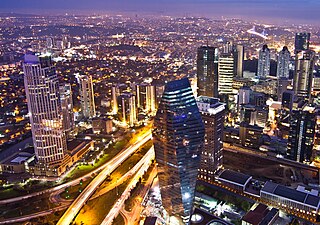
The Turkish construction and contracting industry is one of the leading industries in Turkey. To improve energy efficiency of buildings it has been suggested that green buildings should be defined.

In July 2001, President Abdelaziz Bouteflika became the first Algerian President to visit the White House since 1985. This visit, followed by a second meeting in November 2001, and President Bouteflika's participation at the June 2004 G8 Sea Island Summit, is indicative of the growing relationship between the United States and Algeria. Since the September 11 attacks in the United States, contacts in key areas of mutual concern, including law enforcement and counter-terrorism cooperation, have intensified. Algeria publicly condemned the terrorist attacks on the United States and has been strongly supportive of the international war on terrorism. The United States and Algeria consult closely on key international and regional issues. The pace and scope of senior-level visits has accelerated.

Russia has an embassy in Algiers and a consulate in Annaba, and Algeria has an embassy in Moscow. Algeria currently enjoys very strong relations with Russia.
Events from the year 2008 in Algeria.

The economy of Algeria expanded by 4% in 2014, up from 2.8% in 2013. Growth was driven mainly by the recovering oil and gas sector. Further economic expansion of 3.9% was forecast in 2015 and 4.1% in 2016.
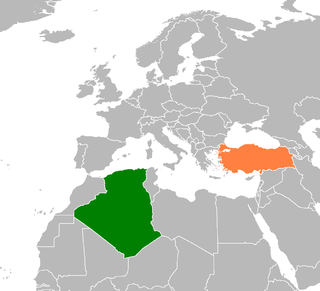
Algeria has an embassy in Ankara, and a general consulate in Istanbul. Turkey has an embassy in Algiers. Both countries are full members of the Union for the Mediterranean.
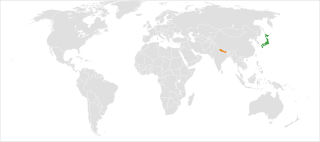
Japan–Nepal relations are foreign relations between Japan and Nepal. Diplomatic relations between the two countries were established on 28 September 1956. Japan has an embassy in Kathmandu. Nepal has an embassy in Tokyo.

Algeria and China have traditionally strong relations, celebrating the 60th anniversary of the establishment of diplomatic relations in 2018. In 2010, relations were considered the strongest of all Arab-Chinese relations behind Sudanese-Chinese relations. While relations are firmly grounded in commercial ties, diplomatic relations have notably extended into socio-cultural and political spheres.

People's Republic of China–Ethiopia relations were established in 1970. Ethiopia has an embassy in Beijing and the People's Republic of China has an embassy in Addis Ababa. By 2016-2018, Chinese direct investment (FDI) in Ethiopia had reached US$4 billion and bilateral trade had grown to $5.4 billion.
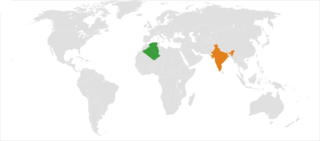
Algeria–India relations refers to the international relations that exist between Algeria and India.
Algeria–Norway relations are the bilateral and diplomatic relations between Algeria and Norway. Norway has an embassy in Algiers, whereas Algeria has an embassy in Oslo.
